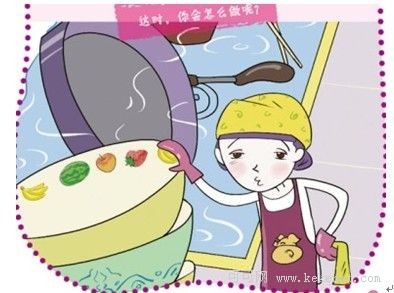(单词翻译:单击)

Doing more housework keeps stress levels higher at the end of the day for both married women and men, increasing health risk, US researchers suggest.
美国研究人员发现,已婚男女下班后,家务做得越多,压力水平就越高,健康风险也由此增加。
Researchers Darby Saxbe and Rena Graesch of the University of California and colleagues tracked 30 dual-earner couples around their homes for three days, using video cameras, interviews and surveys. They required the study participants to provide four saliva samples every day to measure the stress hormone cortisol, which is usually high in the morning -- and during stressful situations - and tends to recover later in the day.
加利福尼亚大学研究员黛比萨克斯比、热那格莱斯奇和同事一起用三天时间通过摄像机、采访以及问卷追踪调查了30对双收入家庭。被调查者需每日提供四份唾液样本以检测他们的压力激素皮质。该激素皮质水平在早晨和在压力较大的情况下较高,,然后会在一天内其他时间回落。
Saxbe says a steeper drop in the hormone is considered healthy. Cortisol levels can affect sleep, weight gain, burnout and weakened immune resistance.
萨克斯比称如若该激素皮质水平在早晨以后的时间内迅速下降,便可断定其主人是健康的。皮质水平可影响睡眠、体重的增长,修复被破坏或弱化了的免疫力。
On average, wives spent more of their time at home doing housework, followed by communication and leisure, while husbands had more leisure time, followed by communication and housework.
一般而言,妻子会花更多的时间做家务,随后进行社交或休闲活动,而丈夫有更多的休闲时间,其次是社交活动和家务劳动。
The study, published in the Journal of Family Psychology, found both wives and husbands who devoted more time to housework had higher levels of evening cortisol and weaker afternoon-to-evening recovery.
这份刊载于《家庭心理学》的研究发现,无论是妻子还是丈夫,只要花更多时间做家务,他们的皮质水平在晚间便会升高,下午到晚上精力恢复得也较慢。
However, husbands who apportioned more time to leisure, and whose wives apportioned less time to leisure, showed stronger after-work recovery, the study says.
然而,该研究还称,那些自己休闲时间较多而妻子休闲时间较少的丈夫们,在工作后恢复得更快。
The findings suggest how the division of labor within couples is structured can implicate health, the researchers say.
研究人员称这些发现揭示出,夫妻间劳动分工模式可影响健康。


